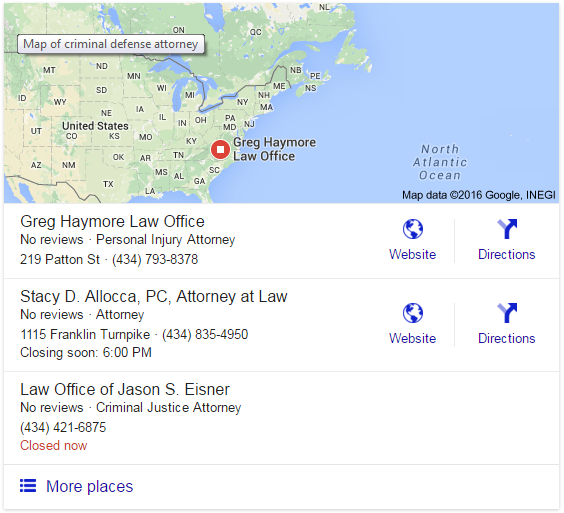Are you a criminal defense attorney who feels like your practice is falling behind the times?
Here are seven things you can do to make your practice more relevant.
1. Establish Your Web Presence
If you want your practice to remain relevant, you have to stay in front of potential clients. According to FindLaw.com and Thomas Reuters, the internet went from the least popular option for finding an attorney in 2005 (7 percent) to the most popular option in 2014 (38 percent).
Of course, by now, everyone has a website. But not everyone is using their website to its maximum potential. If you have an outdated website that offers little more than your firm’s contact information, you’re not going to receive much benefit.
A criminal defense attorney’s website doesn’t need to be fancy, but it does need strong CTAs and a variety of resources, tools and content that will make it valuable to potential clients. It also needs to be optimized for search.
But don’t make the mistake of optimizing your pages around legal jargon. Most potential clients either don’t know or don’t understand those terms, so they probably won’t be typing them into Google. Instead, focus on the terms you hear while discussing legal issues with clients and prospects.
And if you want to increase your visibility, verify your business and get on Google Maps using Google My Business.
2. Take Advantage of Analytics
Another way to zero in on potential search terms is by tracking your site results using Google Analytics. This not only allows you to see what search terms are leading prospects to your website, but it also tracks metrics such as time spent on each page, links clicked and content downloaded.
In addition, you can use lead capture forms and other tracking methods to find out what individual users are doing on your website. Put all of this information together, and you’ve got unprecedented insight into the interests and needs of your prospects, all of which can be used to bolster your marketing strategy.
3. Make Sure You’re Blogging
As a criminal defense attorney, you already understand what potential clients want to know about their legal situations. More importantly, you have a firm grasp on what they actually need to know. So why not use that information to fuel your blog, increase your web traffic and make your practice more relevant?
The numbers speak for themselves:
- Small businesses that blog report 126 percent more lead growth.
- 95 percent of businesses say blogging has resulted in higher search rankings.
- Companies that blog increase web visitors by 55 percent.
- Adding between 21 and 51 blog posts can increase traffic as much as 30 percent.
- Adding at least 52 blog posts can boost traffic by 77 percent.
It’s simple. The more you blog, the more your traffic and relevance will increase — provided you’re writing posts that are truly useful to your target audience. To do that, you have to put the reader first.
Learn to speak their language. Don’t talk down to them, and don’t go over their heads. Criminal defense law is complicated, but you’re in a position to make it much easier for them to understand. This not only positions you as an expert, but also as a trusted friend.
4. Encourage Online Reviews
According to Software Advice, online reviews are the first stop for 83 percent of prospective legal clients. And FindLaw.com says two-thirds of consumers are more likely to hire an attorney with online reviews.
What are those prospects looking for? Forty-eight percent of prospects are hoping to gauge your quality of service and 38 percent put a lot of stock in star ratings.
The takeaway here is three-fold:
- This may not be a revelation, but quality service matters.
- Your online reputation is more important than ever.
- Attorney review sites can be an effective marketing channel for your firm.
Not sure where to focus your efforts? Try Yelp. Prospective legal clients have ranked it the most popular (58 percent) and most trusted (61 percent) website for online reviews.
And if you’re new to online reviews, our 10-step guide can help you get started.
5. Keep Sending Email
Email is consistently ranked the single most effective marketing channel for awareness, acquisition, conversion and retention. This is where you can put your content to good use, nurturing relationships and staying top of mind.
You’ll reach new contacts, interested parties who weren’t quite ready to make a decision initially as well as repeat and referral business. It’s a one-size-fits-all solution that can be broken down into manageable, personalized segments for optimal success.
If you’re not sure where to start, check out our Beginner’s Guide to Engaging in Email Marketing.
6. Expand Your Reach on Social Media
Social media and content marketing go hand in hand. Not only can you share the content that you’ve written for your blog, but your blog visitors and social media followers can share it as well.
This exponentially expands your reach and increases your chances of connecting with new prospects. It also helps build your reputation, establishing you as an expert in criminal defense topics.
But remember, social media isn’t about self-promotion, at least not directly. To make genuine connections, you have to engage with your audience. Offer helpful tips and advice, post to criminal defense related discussion groups, and like and comment on interesting content. In other words, add value to the conversation.
7. Expand Your Referral Network the Old-Fashioned Way
According to the American Bar Association, up to 80 percent of prospective clients will seek out an attorney based on the recommendations of friends and family (46 percent) or based on a previous association (34 percent). So if you want your practice to remain relevant, you have to continue to make new connections and expand your referral network.
There are many ways a criminal defense attorney can make new contacts:
- Volunteer in the community.
- Consider becoming an adjunct professor.
- Join community groups.
- Attend bar association events and get to know your colleagues.
- Attend or, better yet, speak at continuing legal education (CLE) events.
- Keep in touch with old classmates from law school.
- Try networking with contemporary attorneys, who are less likely to have established referral sources in place
- Let other attorneys know when you’re sending them referral business. They’ll be more likely to remember and return the favor.
Wrap-up
Referrals = Relevancy. Times may be changing, but the basic message isn’t — potential clients are more likely to turn to someone they know and trust, if only by association. If you want your practice to stay relevant, you have to expand your network, stay top of mind and grow your referral business.



![Better Email Etiquette Equals Better Marketing Results [16 Rules]](https://www.outboundengine.com/wp-content/uploads/shutterstock_411184843-1-400x250.jpg)

